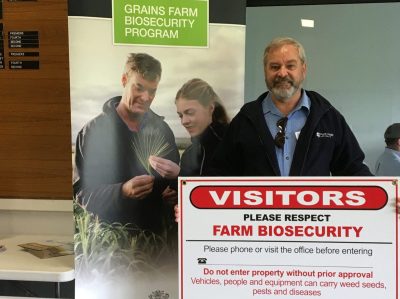
PRIMARY producers have been encouraged to install or replace property biosecurity signs to help protect their businesses from the risk of potentially devastating pests and diseases.
There has been a significant increase in the adoption of farm biosecurity signs in recent years, driven by increased awareness as a result of the global pandemic and nearby emergency animal disease threats.
Landholders can have a commercial signwriter make up signs or craft their own, using at template available on the Farm Biosecurity website.
Grain growers can also download a similar template from the Plant Health Australia website.
Free ready-made signs for grain growers are also available from the Department of Primary Industries and Regional Development’s Northam office.
Western Australian grains biosecurity officer Jeff Russell said it was a good time to do an audit of signs, before the growing season commenced.
“These signs have a temporary life span and depending on exposure to the weather, especially the sun and wind, many are reaching the end of their useful life,” Mr Russell said.
“While it is more costly to get a sign made up by a signwriter, growers can view this as a long-term investment for their farm business.
“If a group of growers place a bulk order for permanent signs, the price per sign is reduced by sharing the set-up cost, making even more economic sense.”
Mr Russell said farm signs were a simple but effective tool to manage on-farm biosecurity risks.
“Farm signs to direct property entries are a first line of defence tool to mitigate pest and disease threats for all primary producers.
“Adopting a ‘come clean, go clean’ philosophy for machinery, livestock, product and people movements on properties is a powerful step to protect businesses.
“Having a clearly marked parking area and clean down areas to ensure all vehicles and machinery are clean before entering production areas is another useful practice.”
Animal Health Australia and Plant Health Australia offer the latest biosecurity information and advice on the Farm Biosecurity Program website.
Vic warning on interstate machinery
Agriculture Victoria grains industry biosecurity officer Jim Moran has reminded growers that second-hand farm machinery meets Victorian biosecurity legislation, and the conditions of entry described in the Victorian Plant Biosecurity Manual.
“Used agricultural equipment and spare parts could pose a high risk to Victoria’s unique environment and agricultural industries,” Mr Moran said in a statement.
“Given the nature of their work, there is a high possibility used machinery could harbour weeds, pests and diseases that we don’t want in Victoria.”
“Therefore, unless they meet specific conditions of entry outlined in the Plant Quarantine Manual (PQM), they are prohibited from entry.”
Annual Ryegrass Toxicity (ARGT), which is potentially fatal to livestock, and the Lupin Anthracnose (LA) fungus are not present in Vic, and are two diseases cited to exemplify the importance of bringing only thoroughly clean used machinery into the state.
“ARGT host material includes cereal crops, first cut lucerne, pasture hay, stock feed or plant waste and could be located anywhere in WA, SA or NSW.
“Any machinery from these states must meet the specific conditions of entry to minimise any risk of introducing ARGT into Victoria.”
South Australia and Western Australia are not free from LA, and restrictions apply to the importation of machinery into Vic from both states.
“These and other biosecurity risks are carried in soil, animal or plant material found on or inside used farm machinery.
“Therefore, they must be thoroughly cleaned, free of plant material and visible soil, and inspected by a government officer.”
A Plant Health Certificate must then be issued before movement into Victoria.
Mr Moran said there are costs and time involved with such a thorough clean, often requiring the partial dismantling of the machine or equipment to access all the hidden-away and hard-to-get-at areas.
“For example, debris is commonly found collecting in the driver’s cabin, on the chassis, in the grain bin, augers, belts, elevators, spreaders, choppers, tyres, rims, sieves, radiator and under any guards.
“Always check early with an Agriculture Victoria Biosecurity officer before you sign up to import a used farm machine into Victoria.
The import prohibition does not apply if the host material is grown on, sourced from, or last used on a property that is located in a state or territory for which area freedom exists.
In the case of LA, this exemption currently applies for Queensland, New South Wales, Tasmania and the Northern Territory, meaning the unrestricted importation of LA host material from these locations is allowed, provided no other quarantine restrictions apply.
Currently, Qld, Tas and the NT have state freedom for ARGT so no permit or PHC is required for machinery from these states.
Tips for buyers:
It’s the importer’s responsibility to ensure all imported, used agricultural equipment is thoroughly clean prior to export and a PHC is obtained. The cost of dismantling, cleaning, and certifying a grain harvester sometimes totalling more than $10,000;
Used agricultural equipment found to be unacceptably contaminated on arrival will be re-exported or subjected to an expensive cleaning process at the expense of the new owner;
Use an experienced machinery dealer who regularly imports from other states. Different dealers offer varying support and services in the price they quote;
Don’t get stuck with a dirty machine. It’s a massive biosecurity risk to your farm and the grains industry. If it does not arrive clean, you will have to clean it before using it;
The Grains Farm Biosecurity Manual is found here:
Refer to the nationally relevant Plant Health Australia and Grain Producers Australia resource, the Biosecurity Manual for Grain Producers, or contact Agriculture Victoria on 136186 for further infomation.
Source: DPIRD, Agriculture Victoria

HAVE YOUR SAY